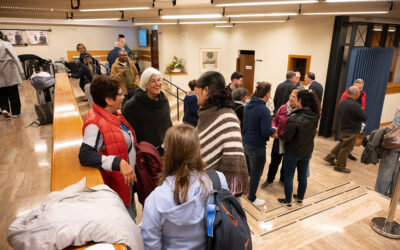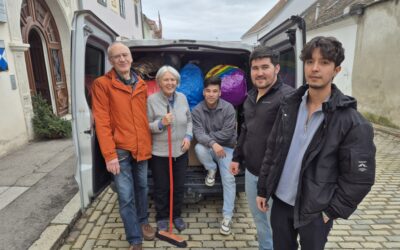Jesus often spoke in images and in parables. These were simple and effective means for teaching the deeper truths that he was bringing. The parable of a shepherd and his flock, in which this Word of Life is found, brings to mind familiar scenes of daily life. Jesus reminds his listeners of the thieves and bandits who raid the flock just as predatory wolves do. He compares himself, on the contrary, to a good shepherd who really takes care of his own sheep: he guides and defends them, even, if necessary, to the point of facing death!
But in Jesus’ case, the parable became a reality: he truly died on the cross “so that we might have life through him”(1Jn 4:9).
«I came so that they might have life and have it more abundantly»
He came because the Father had sent him to bring us his own divine life. In fact, “God so loved the world that he gave his only Son, so that everyone who believes in him might not perish but might have eternal life (Jn 3:16).
The life that Jesus brought from heaven is not the same as the natural life that we received from our parents. The life that he gives us is really “eternal life,” that is, a participation in his life as Son of God, an entering into his intimate communion with God. It is the very life of God, and Jesus can communicate it to us because he himself is the Life. He said so: “I am… the Life” (Jn 14:6), and “from his fullness we have all received”(Jn 1:16).
But the life of God, as we know, is love.
Jesus, the Son of God who is Love, coming down to this earth, lived for love and brought to us that same love that burns within him. He gave us the same flame from that infinite fire and he wants us “alive” with his same life.
«…and have it more abundantly»
Since Jesus does not only possess life, but he “is” Life, he is able to give it abundantly, just as he gives us fullness of joy (see Jn 17:13).
A gift of God is always immeasurable, infinite, and generous just as God is. Thus he fulfills the deepest aspirations of the human heart that hungers for a full life, a life without end. He alone can fulfill that desire for the infinite. He, in fact, brings “eternal life,” a gift not only for when we reach heaven, but also for our present lives. The life of God in us begins now and is destined to never die.
How can we not think of the saints, those Christians who were so completely fulfilled? To us, they seem so full of life that it overflowed all around them.
How was Saint Francis of Assisi able to have such a universal love that he was capable of embracing the poor, of reaching out to the Sultan, of recognizing a brother or sister in every living thing? Where did Mother Teresa of Calcutta, who became a mother for every abandoned child and a sister to every lonely person, find her love? They both lived extraordinary lives, lives that were gifts of Jesus .
«I came so that they might have life and have it more abundantly»
How should we live this Word?
Let’s welcome the life that Jesus is giving us and that already lives in us because of the baptism that we have received and because of our faith, a life that can grow even more in the measure that we love. It is love that makes us live. “Whoever remains in love,” wrote Saint John, “remains in God” (1Jn 4:16) and participates in his very life. Yes, because if love is the life and essence of God, love is also the life and essence of every person. Thus it is also true that every time we do not love, we do not live.
An eloquent witness to this was the departure for heaven of Renata Borlone, a focolarina whose cause for beatification began in these last few months. She had accepted wholeheartedly the news of her imminent death as the will of God. She said that she wanted to be a witness that “death is life,” that it is resurrection. With God’s help, she tried right up to her last breath to show that this is true. And she made it, for she transformed a sad event into one that spoke of the joy of Easter.
Chiara Lubich




0 Comments